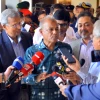The BNP has found itself in a difficult position over the amended Representation of the People Order (RPO), as its provision requiring political parties in an alliance to contest elections using their own electoral symbols has sparked serious concern among the party’s smaller allies.
BNP leaders fear the rule could significantly reduce the electoral chances of these partners.
According to BNP sources, several smaller parties have already appealed to the authorities concerned to withdraw the amendment related to Section 20 (1) of the RPO, which deals with electoral symbols. BNP is also considering ways to push for a revision of the provision and expects its smaller allies to play an active role in the process.
The BNP has yet to finalise seat-sharing with partners involved in the simultaneous movement. Senior leaders have been holding a series of meetings, and a decision is expected within the next week or two. They say that although seat distribution is a major challenge, an even bigger obstacle is the requirement for each party to contest using its own symbol despite running as part of an alliance.
Concerns Among Smaller Parties
BNP leaders believe the amendment puts smaller parties at a clear disadvantage, as contesting under their relatively unknown symbols will weaken their chances of winning. This, they argue, will ultimately benefit their political rivals. The smaller parties want the previous system restored, which allowed them to contest under the symbol of the largest party in the alliance.
Maulana Manjurul Islam Afendi, Secretary General of Jamiat Ulema-e-Islam, said:
Winning becomes more likely when a party contests under a widely recognised symbol. The amendment has curtailed that democratic right. We want the previous provision back.
BNP leaders added that if any of the smaller parties take initiatives on the symbol issue, the BNP will support them.
Who Gains, Who Loses?
Observers believe the amendment disadvantages BNP significantly, while parties such as Jamaat-e-Islami might benefit. Their analysis suggests that although small parties may remain in an alliance, their lack of popular symbols will make it difficult for them to win seats. Without the BNP’s widely recognised ‘Sheaf of Paddy’ symbol, the entire alliance stands to be weakened.
BNP Standing Committee Member Salahuddin Ahmed said:
“Choosing an electoral symbol is a party’s democratic right. The amendment will reduce opportunities for nationally significant leaders to enter parliament.”
Internal BNP sources said the party is considering leaving at least 25 seats for its partners based on their role in the movement, political positioning, and relevance to future government formation. Negotiations with the NCP and Bangladesh Khilafat Majlis are also underway.
Outside the BNP-led alliance, Jamaat-e-Islami, Islami Andolon Bangladesh, and six other parties are part of the simultaneous movement. These parties say the symbol issue is secondary; if an understanding is reached, they will contest using their own symbols while supporting one another.
However, the BNP remains concerned that contesting without the ‘Sheaf of Paddy’ symbol may result in seat losses, especially if rebel or independent candidates enter the race, making victory for alliance candidates even more difficult.

-1763531133.webp)
-1763528155.webp) Prev Post :
Prev Post :
